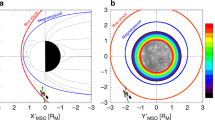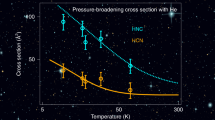Abstract
A NUMBER of experiments have recently been performed by various experimenters in which a mixture of gases containing mercury vapour as one constituent has been illuminated by light from a water-cooled quartz mercury arc. In interpreting the results of these experiments it has generally been assumed that the following process takes place. Mercury atoms first absorb radiation λ2536, an electron thereby being raised to the 2p2 state. Having reached this excited state the mercury atom may collide with one of the other atoms or molecules present and transfer its potential energy over to the other atom or molecule. The energy thus transferred may do one of several things. It may cause a molecule to dissociate; it may excite the colliding molecule or atom; it may all be changed into thermal kinetic energy of the two colliding bodies; or it may do combinations of the above.
This is a preview of subscription content, access via your institution
Access options
Subscribe to this journal
Receive 51 print issues and online access
$199.00 per year
only $3.90 per issue
Buy this article
- Purchase on Springer Link
- Instant access to full article PDF
Prices may be subject to local taxes which are calculated during checkout
Similar content being viewed by others

Author information
Authors and Affiliations
Rights and permissions
About this article
Cite this article
WINANS, J. Collisions of the Second Kind with Excited Mercury Atoms in the 2P State. Nature 118, 46–47 (1926). https://doi.org/10.1038/118046b0
Issue Date:
DOI: https://doi.org/10.1038/118046b0
Comments
By submitting a comment you agree to abide by our Terms and Community Guidelines. If you find something abusive or that does not comply with our terms or guidelines please flag it as inappropriate.


